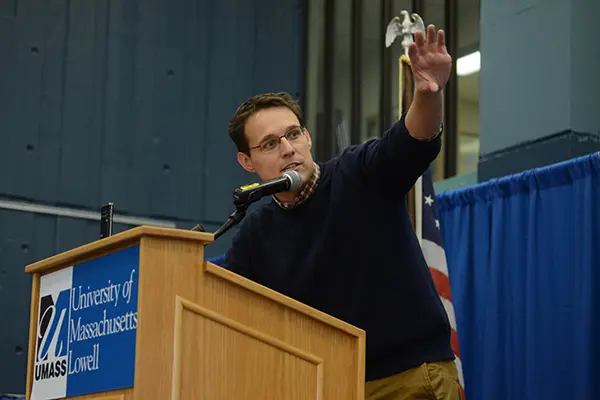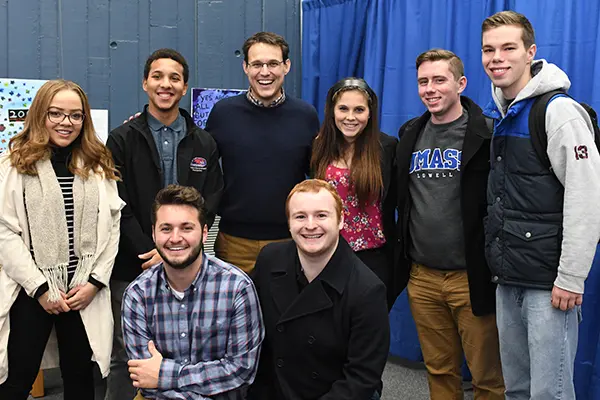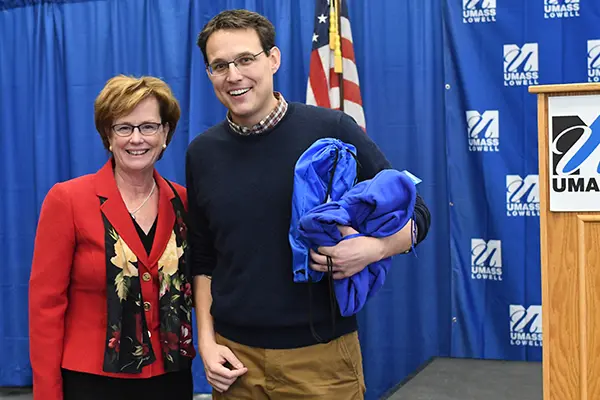Groton Native Returns to Campus, Reviews Trump Win
 Image by Tory Germann
Image by Tory Germann
12/08/2016
By Katharine Webster
MSNBC host and political correspondent Steve Kornacki’s analysis of the 2016 presidential race, which saw Donald Trump win the Electoral College despite a deficit of nearly 2.5 million popular votes, was almost over before it began.
The title of Kornacki's talk was “Election 2016: What the #&^! Happened?”
“What the bleep happened? I have no idea, so thank you very much,” he joked before a full house in O’Leary Library. “It’s one of the most bizarre outcomes we’ve ever seen in a presidential election.”
Then turning serious, and armed with charts and maps breaking down voting patterns by race, education and geographic distribution, he showed how Trump beat the odds and pollsters’ predictions.
First, nonwhite voters didn’t go quite as strongly for Hillary Clinton as they had for Barack Obama four years ago, he said. Nonwhite Hispanic voters gave Trump more votes than they gave Mitt Romney four years ago, and he also did slightly better among Asian-Americans.
Second, Clinton didn’t win a majority of college-educated white voters — 35 percent of the electorate — although her campaign targeted them heavily with television advertising and she got a bigger percentage of their votes than any Democrat in recent history.
“The Democrats thought they would be just so offended by Donald Trump — that they would consider him so basically unfit in terms of his temperament, in terms of the language he used, in terms of the divisiveness — that they would be won over. And the polls said that was happening,” he said. “The Democrats thought they were going to win that group, and they didn’t.”
Finally, white voters without a college education, especially rural residents and blue-collar voters across the northern states from Maine to Minnesota, shifted Republican by large percentages compared with four years ago. While Clinton eked out a win in some Rust Belt cities, she lost others that Obama won overwhelmingly in 2012.
“That’s the final piece of the recipe,” Kornacki said. “Those old factory towns in the industrial Midwest that have been hollowed out for all sorts of reasons over the last generation or so, that’s where Trump’s message resonated the most.”
 Image by Tory Germann
Image by Tory Germann
For Kornacki, a Groton native, his visit was a homecoming of sorts: He took two dual-enrollment classes at the university as a high school senior. He mentioned his university connection during a broadcast report in October on a UMass Lowell/Odyssey poll that found a majority of millennials would prefer that a giant meteor destroy Earth to a Trump presidency, and faculty at the Center for Public Opinion invited him to campus.
Kornacki said the national polls had not gotten the election results wrong. Overall, they predicted a 4 percentage-point win for Clinton in the popular vote; she won by 2 percentage points, which is well within the margin of error.
But polls in individual states didn’t pick up the overwhelming enthusiasm for Trump among blue-collar whites — and they overestimated Clinton’s support among college-educated whites, he said.
Still, a Clinton victory seemed a foregone conclusion based on pre-election polls, Election Day exit polls and even the early returns on election night. Then at around 9 p.m., as Kornacki was watching the returns from Florida, North Carolina and Virginia, Clinton’s path to the presidency began to unravel.
“I’d come off the set, and at that point Hillary Clinton was ahead by 110,000 votes in Florida. I clicked the refresh button about two minutes later and the margin had gone from 110,000 votes down to 4,000 votes,” he said.
 Image by Tory Germann
Image by Tory Germann
North Carolina went from looking like a narrow Clinton win to a Trump victory, and Virginia — which was supposed to be an easy win for Clinton — was too close to call.
“At that moment … it’s that feeling [that] every expectation and assumption you’ve made just dissolves,” he said. “I had to go on TV and describe what was happening, and I had about 30 seconds to recover my composure.”
Chancellor Jacquie Moloney presented Kornacki with a UMass Lowell sweatshirt after the talk and said he’d promised to come back with his dad, a big hockey fan, to watch the River Hawks play. She also praised the Center for Public Opinion and the accuracy of its New Hampshire polls.
“A lot of polls were off when it came to predicting the outcome of the election, but UMass Lowell got it right, successfully predicting the winners of the first-in-the-nation New Hampshire primaries and the final vote for the winners of president, governor and U.S. Senate in New Hampshire,” she said.




